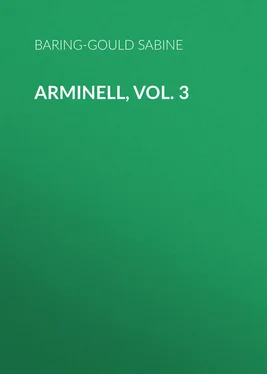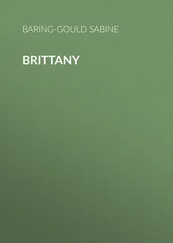Sabine Baring-Gould - Arminell, Vol. 3
Здесь есть возможность читать онлайн «Sabine Baring-Gould - Arminell, Vol. 3» — ознакомительный отрывок электронной книги совершенно бесплатно, а после прочтения отрывка купить полную версию. В некоторых случаях можно слушать аудио, скачать через торрент в формате fb2 и присутствует краткое содержание. Жанр: foreign_antique, foreign_prose, на английском языке. Описание произведения, (предисловие) а так же отзывы посетителей доступны на портале библиотеки ЛибКат.
- Название:Arminell, Vol. 3
- Автор:
- Жанр:
- Год:неизвестен
- ISBN:нет данных
- Рейтинг книги:5 / 5. Голосов: 1
-
Избранное:Добавить в избранное
- Отзывы:
-
Ваша оценка:
- 100
- 1
- 2
- 3
- 4
- 5
Arminell, Vol. 3: краткое содержание, описание и аннотация
Предлагаем к чтению аннотацию, описание, краткое содержание или предисловие (зависит от того, что написал сам автор книги «Arminell, Vol. 3»). Если вы не нашли необходимую информацию о книге — напишите в комментариях, мы постараемся отыскать её.
Arminell, Vol. 3 — читать онлайн ознакомительный отрывок
Ниже представлен текст книги, разбитый по страницам. Система сохранения места последней прочитанной страницы, позволяет с удобством читать онлайн бесплатно книгу «Arminell, Vol. 3», без необходимости каждый раз заново искать на чём Вы остановились. Поставьте закладку, и сможете в любой момент перейти на страницу, на которой закончили чтение.
Интервал:
Закладка:
He nodded, but said nothing.
“And I see’d Miss Arminell do it.”
His eyes opened wide with alarm.
“What the name of the book was, I do not mind; indeed, I do not know, because I cannot read; but I have got the book, and can show it you, and you who are a scholar can read it through from the first word to the last.”
“You have the book?”
“I have; when it fell it went under your raft, but it did not sink, it came up after on the other side, and when you were gone I fished it out, and I have it now.”
“It was red as blood.”
“Aye, and the paint came off on my fingers, but I dried it in the sun; and I have the book now, not in the Owl’s Nest, but in a cupboard of the back kitchen o’ my old house.”
“His likeness was on it.”
“That I can’t say. There is a head of a man.”
“The head of Lord Lamerton.”
“It don’t look like it; the man has black hair and a beard, and his lordship had no beard, and his hair was light brown.”
A shudder came over the captain. Was his last, his firmest anchor to break?
Again, as he had done several times already, he passed his hands over his arms and shoulders and sides, as if peeling off what adhered to him.
“Let me see the book,” he said faintly. “Lead on.”
“I ought to have returned it to Miss Arminell,” said Mrs. Kite; “but I didn’t, because my Tamsine saw it, and said she’d like to read it. She’s mighty fond of what they call a sensational novel.”
“It was the book of the Everlasting Gospel,” said Saltren with a burst of desperation. “Nothing will ever make me believe otherwise.”
“Or that Miss Arminell, who stood in the mouth of the Owl’s Nest, was an angel flying?”
He made no reply, but lowered his head, and pushed forwards.
When they reached the ruined hovel, Mrs. Kite went into that part which had not been dismantled, and brought forth the crimson-covered book from the oven, where it had been hidden, and gave it to her companion.
“It is ‘The Gilded Clique,’” was all he said, and fixed his eyes on it with terror in them.
He dared not look Mrs. Kite in the face; he stood with lowered head before her, and his hands shook as he held the book, so that he could not study it.
“Tell me all that you heard and saw,” he said; then with sudden eagerness, “It was not on the Sabbath?”
“Yes,” said Mrs. Kite, “it was on a Sunday that I saw you.” Then she told him all the circumstances as they had really happened.
Wondrous are the phantasmagoric pictures conjured up by the sun in the desert; the traveller looks on and sees blue water, flying sails, palm groves, palaces, and all is so real that he believes he even hears the muezzin’s call to prayer from the minarets, and the lap of the water on the sands, and the chant of mariners in the vessels. Then up springs a cold air, and in a moment the picture is dissolved and exposes arid waste strewn with bones and utterly herbless. And the words of the woman produced some such an effect on the mind of Saltren. In a minute all the imaginations that had spun themselves out of the little bare fact, and overspread and disguised it, were riven and swept aside.
Captain Saltren stood turning the book about, and looking at the likeness of M. Emile Gaboriau on the cover; it bore not the faintest resemblance to the late Lord Lamerton. The book was headed “Gaboriau’s Sensational novels, the Favourite Reading of Prince Bismarck, one shilling.” And beneath the medallion was “The Gilded Clique.” Sick at heart, with giddy head, Captain Saltren opened the book stained with water, and read, hardly knowing what he did, an advertisement that occupied the fly leaf – an advertisement of “Asiatic Berordnung,” for the production of “whiskers, moustaches, and hair, and for the cure of baldness, and the renovation of ladies’ scanty partings.”
Was this the revelation which had been communicated to him? Was it this which had drawn him on into an ecstasy of fanatical faith which led him to the commission of an unprovoked crime?
Still half-stunned by his fear he read on. “Eminent authorities have expressed their entire approval of the valuable yet perfectly harmless nature of our discovery. In an age like this, when a youthful appearance is so against a young man, those without beard or moustache being designated boys, and scanty hair, eyebrows, and eyelashes, so unproductive of admiration in the fair sex, the Asiatic Berordnung should be universally adopted. Price 1s. 6d.; full sized bottles 3s. 6d. each.”
Captain Saltren’s face was in colour like that of a corpse, he raised his eyes for a moment to Mrs. Kite, and saw the mocking laugh on her lips. He dropped them again, and said in a low voice; “Leave me alone, I cannot think upon what you have said till you are gone.”
“I will return to Chillacot and see the ruin,” she said.
“The ruin?” he repeated, “the ruin?” He had forgotten about his house, he was looking on a greater ruin than that, the desolation of a broken-down faith, and of prostrate self-confidence.
“Mind you do not risk going to the Owl’s Nest,” said Mrs. Kite; “you are not in condition for that, your knees scarce support you. Abide here and read your book, and see what comfort you can get out of it; a firm head and a steady foot is needed for that path.”
He made a sign to the woman to go; he shook as with the palsy; he put his hand to his head. A band as of iron was tightening about his temples. He could not endure to have Mrs. Kite there any longer. He would go mad unless left alone.
She hesitated for a moment, repeated her injunctions to him to stay where he was till her return, and then left.
He looked after her till she had disappeared, and for some little while after she was gone he looked at the bushes that had closed behind her, fearing lest she should return; then he sank down on a heap of stones, put the book from him with a shudder, and buried his head in his hands.
The mirage was past, the dry and hideous reality remained, but Saltren had not as yet quite recovered from the impression of reality that mirage had produced on his mind. We cannot on waking from certain dreams drive them entirely from us, so that they in no way affect our conduct and influence our opinions. I know that sometimes I wake after having dreamed of some amiable and innocent person in an odious light, and though I fight against the impression all day, I cannot view that person without repugnance. Captain Saltren was aware that he had dreamed, that he had believed in the reality of the mirage conjured up by his fancy, had regarded that crimson-covered book as the revelation of the Everlasting Gospel, and though his mind assented to the fact that he had been deceived, he was unable to drive away the glamour of the delusion that clung to him.
I, who write this, know full well that I shall find readers, and encounter critics who will pronounce the case of Captain Saltren impossible; because in the London clubs and in country houses no such delusions are found. What! are we not all engaged in blowing soap-bubbles, in painting mirages, in spinning cobwebs? But then our soap-bubbles, our mirages, our cobwebs, in which we, unlike spiders, entangle ourselves, are not theological, but social and political. Do we not weave out of our own bowels vast webs, and hang them up in the sight of all as substantial realities? And are we not surprised with paralysing amazement when we discover that the bubbles we have blown are not new created worlds, and our cobwebs are dissolved by a touch? I have seen in Innsbruck pictures painted on cobwebs of close texture, with infinite dexterity and patient toil. We not only spin our cobwebs, but paint on them, though I allow we do not picture on them sacred images. Why, my own path is strewn with these gossamer webs of my own weaving that never caught any other midge than my own insignificant self; me they entangled, they choked my windpipe, they filled my eyes, they clogged my ears. Look back, critical reader, at your own course, and see if it be not encumbered with such torn and trampled cobwebs. There is a great German book of nine volumes, each of over a thousand pages, and it is entitled “The History of Human Folly.” Alas, it is not complete! It gives but the record of the inconceivable follies of a few most salient characters. But in our own towns, in our villages, in our immediate families, what histories of human folly there are unwritten, but well known, I go closer home – in our own lives there is a volume for every year recording our delusions and our inconsequences.
Читать дальшеИнтервал:
Закладка:
Похожие книги на «Arminell, Vol. 3»
Представляем Вашему вниманию похожие книги на «Arminell, Vol. 3» списком для выбора. Мы отобрали схожую по названию и смыслу литературу в надежде предоставить читателям больше вариантов отыскать новые, интересные, ещё непрочитанные произведения.
Обсуждение, отзывы о книге «Arminell, Vol. 3» и просто собственные мнения читателей. Оставьте ваши комментарии, напишите, что Вы думаете о произведении, его смысле или главных героях. Укажите что конкретно понравилось, а что нет, и почему Вы так считаете.












